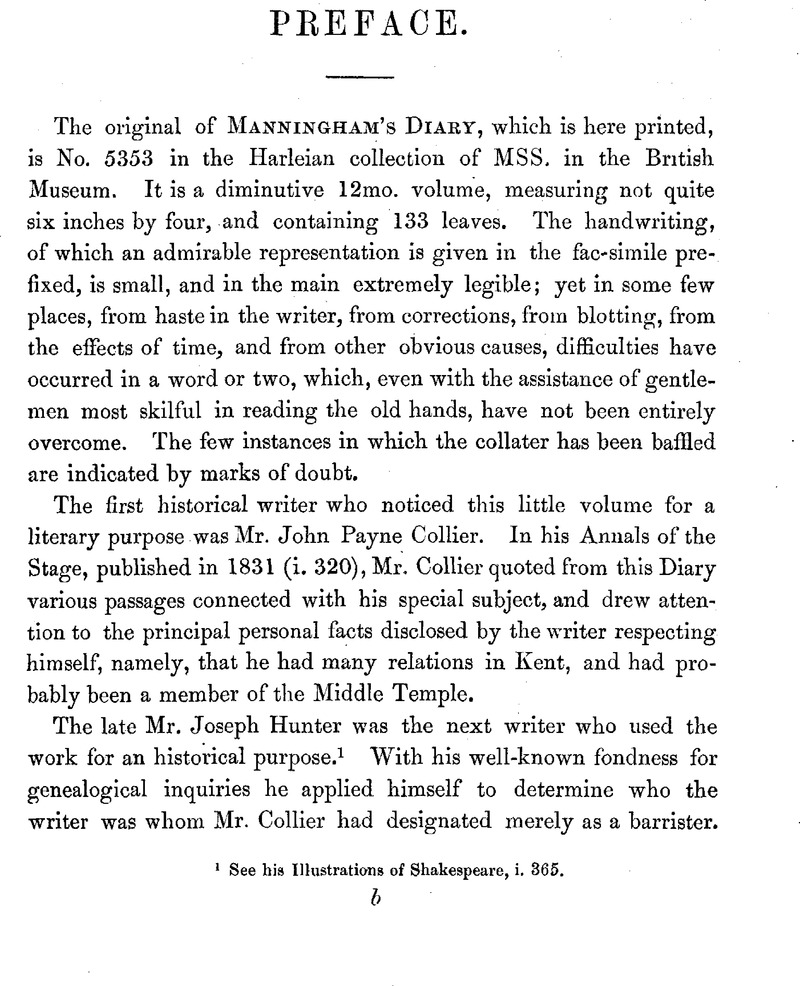No CrossRef data available.
Article contents
Abstract

- Type
- Preface
- Information
- Copyright
- Copyright © Royal Historical Society 1868
References
page i note a See his Illustrations of Shakespeare, i. 365.
page iii note 1 Vol. ii. p. 215, ed. 1782.
page iii note 2 P. 108.
page iii note 3 Lond. 1769, fol. p. 793.
page iii note 4 The inscription is surmounted by a bust of singular coarseness, evidently the work of some country sculptor, and executed in the worst taste and manner.
page iv note 1 “Honestá natus familiá” are the words of the inscription to Richard Manningham, the very words used also as descriptive of the descent of Sir Thomas More on his monument in Chelsea church; familiá non celehri sed honestá natus. (Faulkner's Chelsea, i. 207.)
page v note 1 Diary, pp. 49, 61.
page v note 2 The last notice we have of her is under the date of 1595, when her husband, “at her request and for her sake,” lent her kinsmen, Arnold Verbeck, Abraham Verbeek, and Goris Besselles, merchant-strangers, 400l. which remained due with all interest upon it up to the 21st January 1611–12, the date of his will. He forgave hia debtors the amount, provided they paid 40l. a piece to Margarita and Susanna Verbeck, daughters of Arnold, and to the testator's niece Janeken Vermeren, daughter of his first wife's sister, within twelve months after his decease.
page vi note 1 The registers of East Mailing do not begin until 1640. We beg warmly to acknowledge our obligations to the Rev. W. L. Wigan, the rector, who in the kindest manner searched from 1640 to 1660 for entries relating to the Manninghams, but without finding anything about them.
page vi note 2 Diary, pp. 108, 111.
page viii note 1 The year 1611, given on the monument as that of the death, is contradicted by the date of the will and other circumstances. It should have been 1612.
page ix note 1 “Verá fide Christianá” are the words of the epitaph, which were deemed an authority by the Index-maker for Clutterbuck's Hertfordshire, ii. 370, for entering a “Christiana Curie” in his list of names.
page x note 1 See Lanad. MS. No. 985.
page xvii note 1 So skilfully that one is inclined to suspect that the business of note-taking may have been at that time one of the branches of legal education. A few occasional mistakes of course there are, and when extremely palpable we have sometimes not thought it worth while to notice them.
page xviii note 1 We referred the passage to our late dear friend the eminent Kentish antiquary and founder of the Archaeological Society for that county, the Rev. Lambert B. Larking, and received in reply one of his customary kindly and suggestive letters. Since we wrote to him, his earthly career has come, alas ! to an end. The Camden Council have lost a distinguished member, and many persons a singularly warm-hearted and unselfish friend. He was indeed one oi those attractive characters who carry into old age the fervour and generosity of early life. There never lived a man in whose heart of hearts there dwelt a deeper scorn of everything untruthful, disingenuous, or mean, or who was more distinguished by a total abandonment of all selfish interests. Deeply versed in the history of his beloved native county, and possessed of large antiquarian collections derived principally from unpublished materials, the information which he had gathered through a course of many years was at the service of every applicant, and frequently furnished valuable materials for other writers, whilst an over-anxiety to attain an impossible completeness prevented his bringing to an end works which would have established his own right to a high position in the literature of research. His work on the Domesday of Kent we trust will soon be issued to the subscribers. We doubt not that it will justify our estimate of the scholarship and diligence in inquiry of our kind and amiable friend.




